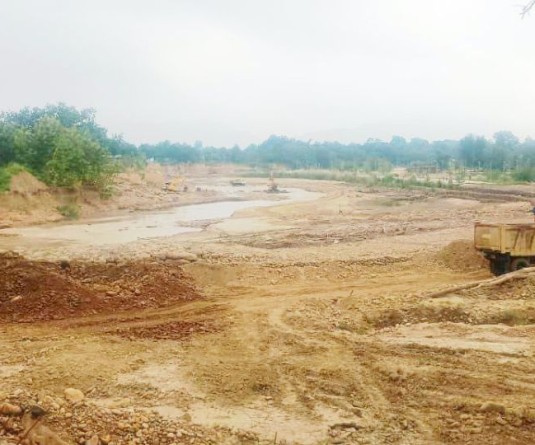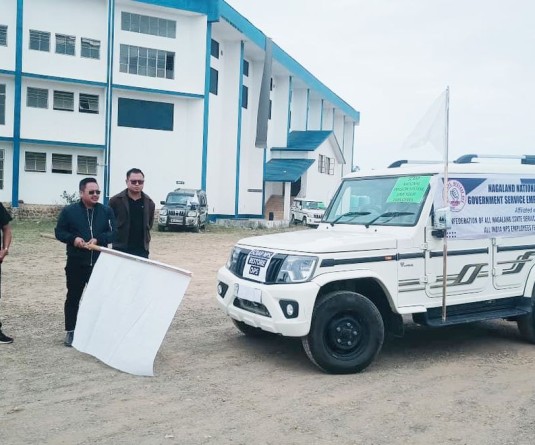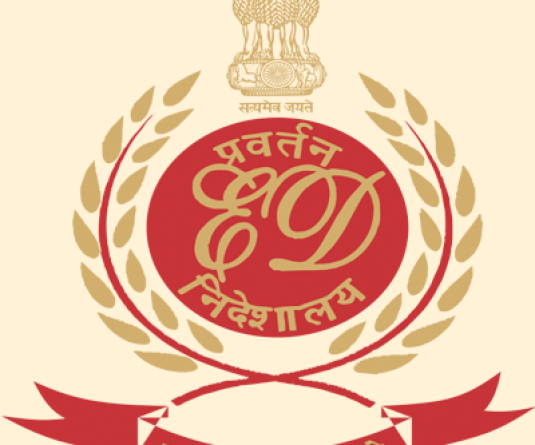Principal Secretary, Health & Family Welfare, I Himato Zhimomi; AONEI president Dr. AK Kalita, AONEI secretary Dr. Vikas Jagtap, former chief secretary Banuo Z Jamir, principal investigator PBCR, NHAK Dr. V Khamo and others during the release of AONEI newsletter at the 14th annual conference at Hotel Japfü on February 2. (Morung Photo)
NHAK’s TCCC to be functional by 2019 end
Our Correspondent
Kohima | February 2
The long due Tertiary Care Cancer Centre (TCCC) at Naga Hospital Authority Kohima is set to be functional by the end of this year. Principal Secretary Health & Family Welfare Nagaland, I Himato Zhimomi informed this today during the inaugural function of the 14th annual conference of the Association of Oncologists of North East India (AONEI) at Hotel Japfü in Kohima.
The announcement comes as a beacon of hope for cancer affected patients and families as Nagaland has been grappling with an increasing number of cancer cases every year (600 or more) against the absence of government cancer treatment facilities.
Expressing concern that the state has become one of the leaders in ‘providing cancer patients’, he underscored the need for both the government and medical practitioners to jointly fight this together: to reach out to as many people to firstly screen themselves at the earliest, to get the right treatment at the right cost, at the right place and with the right rehabilitation and palliative care.
He said the TCCC should be coming up in Kohima by the end of 2019 and the goal of the government is to ensure that the centre is upgraded to a state cancer institute in the next two-three years.
“I am also happy to state that we will be having the right academics. The state’s first medical college should be also coming up two years from now and oncology will be a department, which should be of prime importance for our state. And we look forward to the expertise that is available here in AONEI and we will look forward to your guidance in that sphere,” he told the delegates.
With regard to cancer care for poor families, Zhimomi spoke about the Pradhan Mantri Jan Arogya Yojana (PMJAY) which is aimed at reducing the financial burden on BPL card holders upto Rs. 5 lakhs. It may be mentioned here that the TCCC for NHAK is a Rs. 45 crore project where the state government will pay 10% and the Ministry of Health and Family Welfare, Government of India 90%. The latter had released the first installment, a sum of Rs. 13.23 crore during the financial year 2016-17.
When queried about the construction of the TCCC, principal investigator Population Based Cancer Registry NHAK Dr. V Khamo said it was still at a very initial stage. She revealed that the centre should have been set up a long time ago but there had been many delays, problems and technical issues. However, she informed that treatment equipments have been procured.
President AONEI Dr. AK Kalita of Dr. B Borooah Cancer Institute, Guwahati, and AONEI secretary Dr. Vikas Jagtap of NEIGRIHMS also delivered greetings during the programme. On the second day, the conference will have several scientific sessions, paper presentations, case studies and panel discussion.
Cancer survivor’s wish list
During the programme, former Chief Secretary, Banuo Z Jamir delivered a message from cancer survivors and shared some general concerns. While narrating her own experiences battling with a stage two ovarian cancer in 2001, she empathised with the numerous struggles that a patient and his or her caregivers face including fear, trauma, cost of treatment, travelling out of state for treatment and searching for accommodation etc., to a prolonged recovery due to lowered immunity.
She put it across that cancer patients do not want pity but like to be encouraged with positive advice as it gives hope, which is essential for healing.
Jamir stated that although cancer survivors in Nagaland are yet to organise themselves into a formal body, they were willing to, individually and in small groups, collaborate with the AONEI and the state government in works of creating awareness in social and community programs. She also presented a wish-list from the community which included introduction of counselling for cancer patients and families and create a channel for disseminating information about various treatment regimes and facilities for treatment; subsidising the cost of treatment and offering free treatment to BPL category; facilitating chemotherapy in as many hospitals in the districts so that patients are saved the cost of travelling beyond their homes; associating survivors in designing programs in cancer activities; and introduction of training in palliative care.


.jpg)



